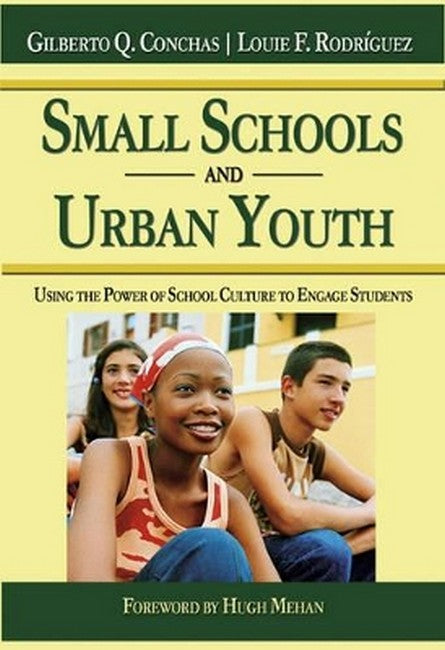Gilberto Q. Conchas obtained a Ph.D. in sociology from the University of Michigan, Ann Arbor. Currently, he is an Associate Professor of Education at the University of California at Irvine. Dr. Conchas also holds joint appointments in the Chicano/Latino Studies and Sociology Departments. Prior to UCI, he was Assistant Professor of Education at the Harvard University Graduate School of Education. Dr. Conchas' work focuses on inequality with an emphasis on urban schooling systems. His research specifically focuses on the sociocultural processes within the urban school context that structure variations in educational opportunity for low-income immigrant and U.S-born Latino, Asian American, and African American youth. He is the author of The Color of Success: Race and High-Achieving Urban Youth (TC Press, 2006). Dr. Conchas teaches courses on theory, policy, and practice about race and urban schooling. Louie F. Rodriguez obtained a doctorate in education from Harvard University Graduate School of Education. Currently, he is an Assistant Professor in Urban Education and Social Foundations at Florida International University in Miami. He is also a Research Fellow at the Center for Urban Education and Innovation at FIU. While at Harvard, Dr. Rodriguez worked with several urban elementary, middle and high schools and communities as a teacher, consultant, and researcher. He also led several research initiatives examining high school reform, school culture, educational policy, and school dropout. His current research examines the intersection between school reform, educational policy, and school culture, specifically as they relate to preventing or perpetuating student/teacher engagement and dropout. He has several articles under review in academic journals, has published in various education-related magazines, and has presented his work at several national conferences. Dr. Rodriguez teaches courses in urban education, educational policy and theory, and social and cultural foundations in education. Dr. Rodriguez was born and raised in the Chicano communities of San Bernardino, CA.
Request Academic Copy
Please copy the ISBN for submitting review copy form
Description
Foreword by Hugh "Bud" Mehan Preface Purpose of the Book Comparative Research Design Organization of the Book Who This Book Is for Acknowledgments About the Authors 1. Digging Beneath the Layers of School Reform: Size, Culture, and Personalization 2. California Career Academies: How Structure and Culture Create Optimism Among Low-Income Urban Youth 3. Structuring Competition and Teamwork: Reproducing the Status Quo and Challenging Inequality Side-by-Side 4. The Case of Boston: How "Small" Schools Forge Academic and Relational Possibilities in the Urban Context 5. Beneath School Structure: How School Culture Shapes Relational and Academic Engagement of Urban High School Students in Boston 6. Conclusion: Towards a Critical Understanding of School Culture References Index
"This book is critical for anyone working to change urban schools to effectively serve all students. Too often we succumb to the notion that substantive change is not possible at the high school level, but this book proves how wrong-headed that concept can be. These authors bring the voices of real teachers and real students to the table to demonstrate how small schools focused on relationship building and 'personalization' can perform miracles!" -- Lisa D. Delpit, Executive Director and Eminent Scholar "Finally, educators leading the movement to smaller high schools have a resource they can draw upon for guidance and direction. This book offers clear, practical advice on how to create small schools that are effective in meeting student needs." -- Pedro Noguera, Professor "The strengths include the book's readability. The examples are vivid and the students' quotes are powerful. The qualitative research style brings a personal feel that is effective." -- Gary Peters, Assistant Professor of Educational Leadership and Research "The book reports on an actual research project and presents numerous quotes from students to support the points being made. It provides a good model of data-driven recommendations." -- Harold E. Wilson, Professor of Educational Leadership "I love the themes of relationships, community, respect, personalization, and small schools." -- James L. Drexler, Education Department Chair "Relevant, individualized, and an insightful read. This book will be useful for any school system working to develop academies." -- Nancy Betler, Teacher Mentor "The need for a book on this topic is urgent, and the contributions from the volume are significant. The writing is excellent, the data is engaging, and the conceptualization is insightful, individualistic, and challenging." -- Lila Jacobs, Professor and Coordinator "This book will be a very helpful and needed addition to the research that clearly establishes how large numbers of our students, particularly big-city students, are being systematically lost because of the size and purposelessness of the schools that they are forced to attend. Relationships are critical, and small schools have shown themselves to be most attentive to and proficient at using small size to personalize educational experiences for urban youth." -- Rodney Muth, Professor "An excellent survey of the cultural and structural features of small schools in two major urban cities. This narrowed focus allows for an analysis of school culture and student involvement on a macroscopic level, creating a fine sociological investigation suitable for both education and sociology libraries." -- The Bookwatch, March 2008 "It is the voice of students in two separate urban centers, Oakland and Boston, that make the book unique. Here, the authors allow students to speak for themselves, and there is honesty in their words that makes the reality surrounding urban school reform resonate in a way that quantitative studies cannot. For anyone wishing a clear and concise introduction to the issues surrounding the restructuring of large urban schools into smaller learning centers, this book is a good place to begin." -- CHOICE Magazine, June 2008, Vol. 45(10) "Conchas and Rodriguez's work is very encouraging in its suggestion that intentional and relational school cultures have some potential to narrow educational achievement disparities." -- Harvard Educational Review, Summer 2008

